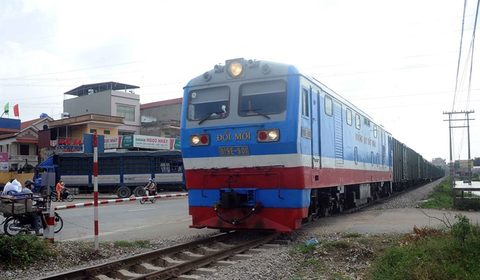Public or non-public, equitised State-owned enterprises (SOEs) will have to trade shares on the Unlisted Public Company Market (UPCoM). The move to force equitised SOEs onto the stock market is intended to increase the transparency of those companies and protect the rights and benefits of shareholders.

A stretch of railway that runs through Thuong Tin District, Ha Noi is managed by the Vietnam Railway Corporation. Equitised State-owned enterprises may have to trade shares on the Unlisted Public Company Market (UPCoM) regardless of whether or not they are public.
At the moment, around 700 equitised SOEs reportedly do not trade shares on the stock market, including the Vietnam Railway Corporation (VNR) and the Vietnam Coal and Minerals Industry Group (Vinacomin), vtv.vn reported.
The common reason for those companies is that they have less than 100 shareholders, which is a required condition for them to be considered public companies and trade shares on the stock market.
Under the Law on Securities and relevant regulations, public companies are neither listed nor traded on the stock market and they do not have to fulfill their commitments with shareholders, especially regarding information disclosure.
Therefore, those companies are unwilling to make their shares tradable on the stock market because if they do so they will have to comply with several regulations they see as unnecessary.
As those companies are non-public and non-traded firms, shareholders have great difficulty accessing the firms’ information, raising concerns over whether the companies are in good condition.
Some individual investors like Le Thi Minh Chau and Nguyen Thang Long are expecting the equitised SOEs to trade shares on the stock market soon so the business operations become transparent and government agencies will be able to inspect those companies to protect their investments.
In addition, those individual investors want those companies to improve so that they are able to sell the shares they have purchased to earn a profit.
If the SOEs are traded and/or listed on UPCoM, the unlisted marker’s regulator, which is the Ha Noi Stock Exchange (HNX), will have a great deal of paperwork on its hands.
According to Nguyen Tuan Anh, HNX’s deputy general director, the equitised SOEs that have not been traded on UPCoM will have to complete all required documents and procedures so that their businesses are transparent and public.
The HNX also provides those companies with online accounts so that they are able to disclose information in conveniently and quickly to help improve the business, Anh said, adding that the northern market regulator has cut the number of required procedures for those firms to trade on UPCoM.
Dang Quyet Tien, deputy director of the corporate finance agency at the finance ministry, said that the ministry is working on some new solutions, including the State’s divestment from the companies in which the Government does not need to take the controlling stake, he said.
The finance ministry will work with the Government, other ministries and local authorities to speed up the selling of the State’s capital in those companies to attract more investors and raise more capital for the businesses, meeting the requirements of a public company, he added.
In addition, the finance ministry and market regulators are working on the legal policy to guide when SOEs must trade shares on the stock market or else face fines and punishment, Tien added.
VNS